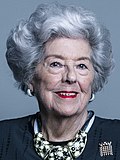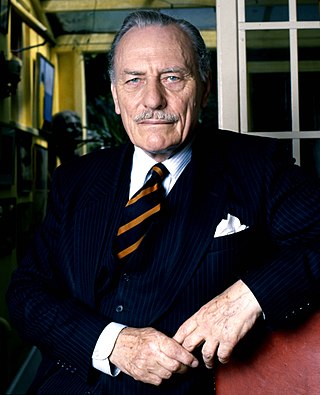
John Enoch Powell was a British politician. He served as a Conservative Member of Parliament (1950–1974) and was Minister of Health (1960–1963) then Ulster Unionist Party (UUP) MP (1974–1987). Before entering politics, Powell was a classical scholar. During the Second World War, he served in both staff and intelligence positions, reaching the rank of brigadier. He also wrote poetry, and many books on classical and political subjects.

The 1970 United Kingdom general election was held on Thursday 18 June 1970. It resulted in a surprise victory for the Conservative Party under leader Edward Heath, which defeated the governing Labour Party under Prime Minister Harold Wilson. The Liberal Party, under its new leader Jeremy Thorpe, lost half its seats. The Conservatives, including the Ulster Unionist Party (UUP), secured a majority of 30 seats. This general election was the first in which people could vote from the age of 18, after passage of the Representation of the People Act the previous year, and the first UK election where party, and not just candidate names were allowed to be put on the ballots.
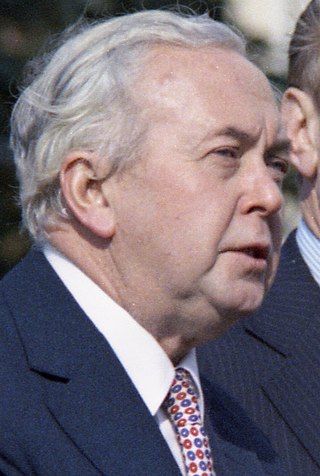
The February 1974 United Kingdom general election was held on Thursday 28 February 1974. The Labour Party, led by Leader of the Opposition and former Prime Minister Harold Wilson, gained 14 seats but was seventeen short of an overall majority. The Conservative Party, led by incumbent Prime Minister Edward Heath, lost 28 seats. That resulted in a hung parliament, the first since 1929. Heath sought a coalition with the Liberals, but the two parties failed to come to an agreement and so Wilson became Prime Minister for a second time, his first with a minority government. Wilson called another early election in September, which was held in October and resulted in a Labour majority. The February election was also the first general election to be held with the United Kingdom as a member state of the European Communities (EC), which was widely known as the "Common Market".

Sir Gerald David Nunes Nabarro was a British businessman and Conservative Party politician who was an MP from 1950 until his death. Nabarro positioned himself on the right of the Conservative Party. Though he never left the backbenches, he was a comparatively high-profile political figure, owing in large part to his eccentric personal style.
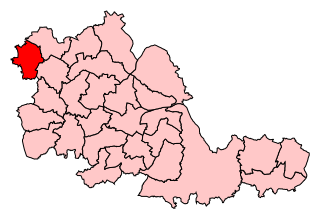
Wolverhampton South West is a constituency created in 1950 represented in the House of Commons of the UK Parliament since 2019 by Stuart Anderson of the Conservative Party.
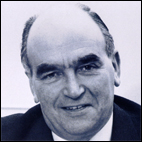
Henry William West was a Northern Irish unionist politician who served as leader of the Ulster Unionist Party (UUP) from 1974 until 1979.
Wednesbury was a borough constituency in England's Black Country which returned one Member of Parliament (MP) to the House of Commons of the Parliament of the United Kingdom from 1868 until it was abolished for the February 1974 general election.
Parliamentary by-elections in the United Kingdom occur when a Member of Parliament (MP) vacates a House of Commons seat during the course of a parliament.

The 1986 Northern Ireland by-elections were fifteen by-elections held on 23 January 1986, to fill vacancies in the Parliament of the United Kingdom caused by the resignation in December 1985 of all sitting Unionist Members of Parliament (MPs). The MPs, from the Ulster Unionist Party, Democratic Unionist Party and Ulster Popular Unionist Party, did this to highlight their opposition to the Anglo-Irish Agreement, signed the month before.
The 1945 Newport by-election was a parliamentary by-election held on 17 May 1945 for the British House of Commons constituency of Newport in Monmouthshire. It was the last by-election of the 1935–1945 Parliament.
The 1941 West Bromwich by-election was a parliamentary by-election held for the British House of Commons constituency of West Bromwich in Staffordshire on 16 April 1941. The seat had become vacant on the resignation of the Labour Member of Parliament Frederick Roberts, who had held the seat from 1918 to 1931 and again from the 1935 general election; he died later in 1941.
The 1963 West Bromwich by-election was a by-election held for the British House of Commons constituency of West Bromwich in Staffordshire on 4 July 1963. It was won by the Labour Party candidate Maurice Foley.

The 1972 Rochdale by-election, was a parliamentary by-election held on 26 October 1972 for the British House of Commons constituency of Rochdale.

The 1984 Cynon Valley by-election was a parliamentary by-election held on 3 May 1984 for the British House of Commons constituency of Cynon Valley.
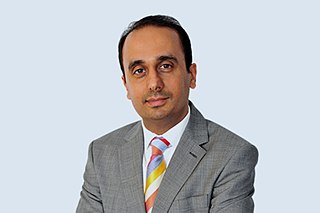
Paul Singh Uppal is a Conservative Party politician from the United Kingdom. He was the Member of Parliament for Wolverhampton South West from the 2010 general election to 2015. Uppal attempted to win the seat back at the 2017 general election
In the United Kingdom, a parliamentary by-election occurs following a vacancy arising in the House of Commons. They are often seen as a test of the rival political parties' fortunes between general elections.
The Leith Burghs by-election was a Parliamentary by-election held on 20 February 1914. The constituency returned one Member of Parliament (MP) to the House of Commons of the United Kingdom, elected by the first past the post voting system.
The 1913 Leicester by-election was a Parliamentary by-election held on 27 June 1913. The constituency returned two Members of Parliament (MPs) to the House of Commons of the United Kingdom, elected by the first past the post voting system.

The October 1974 United Kingdom general election in Northern Ireland was held on 10 October with 12 MPs elected in single-seat constituencies using first-past-the-post as part of the wider general election in the United Kingdom.
